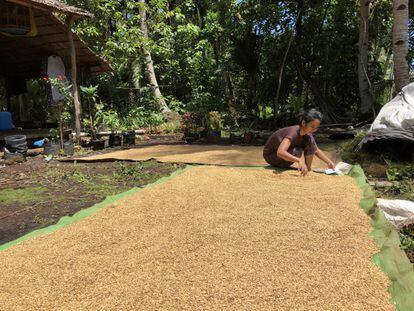Note to readers: EL PAÍS offers the Future Planet section for its daily and global information contribution on the 2030 Agenda. If you want to support our journalism,
subscribe here.
Peatlands, a type of acidic wetland in which organic matter accumulates, are ecosystems that perform valuable environmental functions in mitigating climate change. But by deforesting and draining them, they release carbon and other climate-warming gases into the atmosphere. Hence the importance of conserving and restoring them properly. Those in Indonesia store approximately 80 billion tons of carbon, about 5% of all stored in the soil globally. However, a combination of corporate greed and government failures related to the expansion of palm oil plantations in the west of the country, is causing damage to resident communities and, also, causing serious effects on the environment,as denounced by the NGO Human Rights Watch (HRW) in a report published this summer.
More information
Africa, a magnet for palm oil cultivation
What if palm oil could help protect the Amazon?
Mexican palm oil wants to be sustainable
The main accusation of this NGO is that the Government of West Kalimantan, one of the five provinces of the Indonesian part of the island of Borneo, is promoting increased production of palm oil, but is not guaranteeing that the national companies involved in the various stages of its production —from the cultivation of oil palm to the refinery— comply with national legislation.
In recent years, there have been no improvements in this regard for residents or the land, and furthermore, new laws could facilitate abuses.
Palm oil is a widely used product for the manufacture of food, beauty products and biofuel.
Indonesia is the largest producer of palm oil in the world and in recent years large tracts of its natural forests have been cleared to make way for these plantations, significantly increasing greenhouse gas emissions.
Peatlands in Indonesia store approximately 80 billion tonnes of carbon, about 5% of all stored in the soil globally
In the report
Why Our Land ?:
Indonesia's Palm Oil Expansion
Putting
Peatlands and Livelihoods at Risk
, HRW discusses the way PT Sintang Raya, a private company, a subsidiary of the Deasang Corporation of South Korea, in three villages in West Kalimantan.
A woman drying grain in the sun in West Kalimantan, Indonesia.
A palm oil concession overlaps her farmland and threatens access to food for her and her family.Juliana Nnoko-Mewanu / Human Rights Watch
The text denounces that the Indonesian government is not protecting the rights of the communities that live in or near these peatlands converted into commercial agriculture. Residents have not only been unable to voice their opinion on these changes, but those who have spoken out have suffered the consequences, including harassment and police intimidation. According to HRW, plantation expansion has also fueled hundreds of conflicts over land, including between communities formed over decades as part of a central government-sponsored national resettlement program.
The Indonesian transmigration program is a population plan that consists of transferring millions of families from the most populated islands (such as the island of Java) to those that are less so (such as Borneo). In the 1970s, many people were relocated to forests, including forested peatlands. Over time, the Administration has granted concessions for oil palm and other plantations in the same areas, which is why families question the property titles obtained, since the compensation for losing their territories has been minimal or null.
In 2010, government officials, including the Police, organized a meeting with community leaders and representatives of PT Sintang Raya.
Abdul Majid, a 42-year-old man from one of the affected communities, attended the assembly.
As he told the NGO, the company said: "We all have the required permits, you can have ten lawyers file a lawsuit, we will be waiting."
There was no discussion about compensation or anything else ”.
Community members told HRW that the plantations are damaging their livelihoods
The author of the report, Juliana Nnoko-Mewanu, explains that in 2011 the residents of some villages took legal steps to reclaim their land by facing this company. "Your request was successful," he says. And PT Sintang Raya's subsequent appeals did not go ahead. In 2014, the Indonesian Supreme Court ruled that the company should exclude from its concession land belonging to the households that sued. But the company has not implemented the decision and the responsible government agency has not complied with the court ruling.
Community members told HRW that the plantations are damaging their livelihoods.
Since the company began operating in the area, pests have increased and salt water intrusions have been recorded in the dry season, causing an increase in soil salinity and low crop yields, among other problems.
In 2018, Indonesian President Joko Widodo established a team with the goal of accelerating a program that would facilitate local communities greater control of their lands.
However, the report stresses that these actions conflict with other new laws aimed at encouraging investment in Indonesia.
These limit public participation and government oversight.
West Kalimantan has peatlands of about 1.7 million hectares, which represents about 29% of the total area of the province. And they store about 3.6 million tons of carbon. The logging and demolition of forests for oil palm cultivation has resulted in the loss of biodiversity and releases huge amounts of CO² into the atmosphere, causing the peat to sink and making the soil more susceptible to fires and floods.
In 2015, peatland fires and toxic smoke emitted led to the hospitalization of more than half a million people due to acute respiratory infections, according to the UN Office for Project Services (UNOPS).
Direct and indirect damages were also evident.
They cost approximately $ 16 billion to the Indonesian national economy.
About 13,500 million euros.
In 2015, peatland fires and toxic smoke emitted led to the hospitalization of more than half a million people due to acute respiratory infections.
UN Office for Project Services (UNOPS)
For more than a decade, HRW has pointed out that Indonesia's mismanagement of land and forestry has serious global implications. The researcher Nnoko-Mewanu remarks that the NGO she works for has published reports in this regard in 2009, 2013 and 2019. In 2019, “a government study found that 3.1 million hectares, or around 19% of the total oil palm plantations in the country were operating without valid government permits in forest areas, ”he says.
Wahyu Setiawan, head of the West Kalimantan Agrarian Reform Movement (AGRA), told the NGO that in the case of PT Sintang Raya, although there is already a verdict from the Supreme Court, the company is still operating as if this ruling were only a nonsensical sheet of paper.
“The regent at the time, Rusman Ali, said in public that the company had to comply with the court ruling, but has not yet done so.
And that, legally, they had done everything they could, "he concludes.
FUTURE PLANET can follow on
,
and
, and subscribe
here
to our 'newsletter'
.



/cloudfront-eu-central-1.images.arcpublishing.com/prisa/RSVSTQFDNZHWVNNUYWZ2MAMOUE.JPG)

/cloudfront-eu-central-1.images.arcpublishing.com/prisa/FO2F5WJG7FGW7DM7VPOOYNFMFI.jpeg)



/cloudfront-eu-central-1.images.arcpublishing.com/prisa/PBMVWQBLQRD6RCIWTKBVIUEINA.jpg)